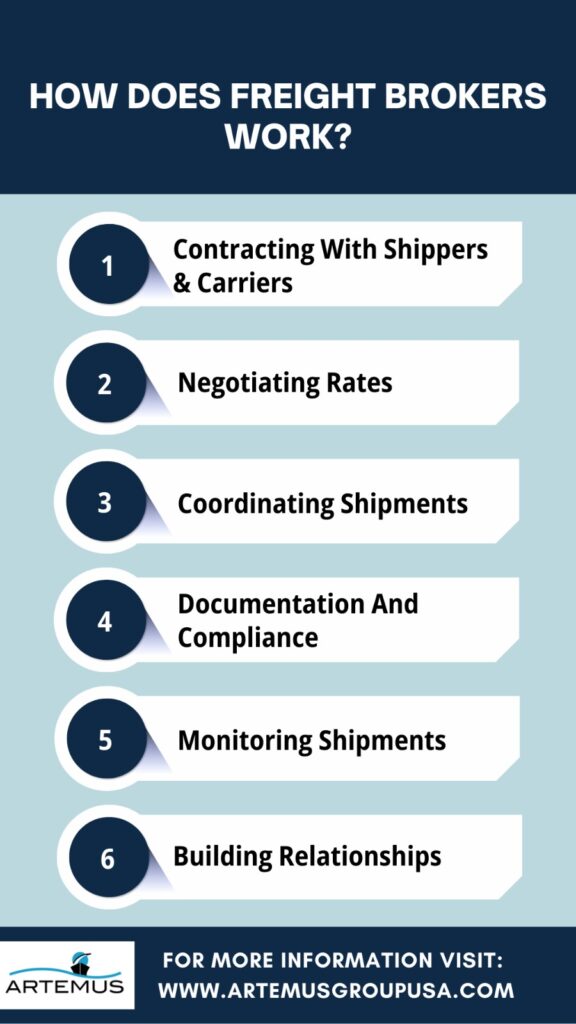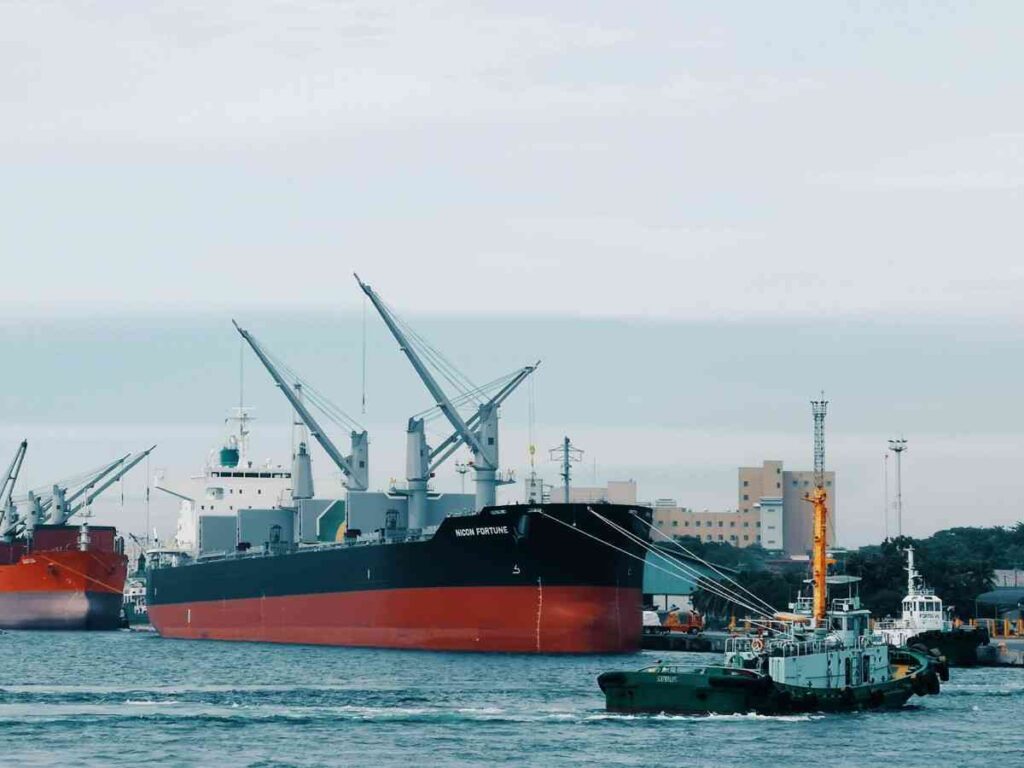
What Is Inbound Logistics & Outbound Logistics? A 2025 Guide
In the dynamic world of supply chain management, understanding the nuances of inbound and outbound logistics is crucial for operational

In the vast world of logistics and transportation, efficient coordination is paramount for smooth operations. Amidst the complex web of moving parts, one pivotal player stands out: the freight broker. But what exactly is a freight broker, and how do they contribute to the seamless flow of goods across the globe?
At its core, a freight broker acts as a vital intermediary between shippers and carriers, orchestrating the movement of cargo from point A to point B. They serve as the glue that binds together the intricate network of transportation services, facilitating the timely and cost-effective delivery of goods.
Among the multitude of freight brokerage firms, Artemus Transportation Solutions stands out as a beacon of innovation and efficiency. Specializing in cutting-edge software solutions, Artemus offers some comprehensive tools tailored specifically for freight brokers for USA customs clearance – ISF (Importer Security Filing), AMS (Automated Manifest System). & AES (Automated Export Filing).
Table Of Contents
A freight broker serves as an intermediary between shippers and carriers, coordinating the transport of goods from one place to another. Unlike a freight forwarder who takes possession of the freight, a broker doesn’t own the transportation assets but instead arranges the logistics
Their role involves negotiating rates, coordinating shipments, and ensuring that goods are transported efficiently and safely. Freight brokers play a crucial role in the supply chain, connecting businesses with reliable transportation solutions and optimizing freight movement across various modes of transport, such as trucks, trains, ships, and planes.
Related: How To Start A Freight Forwarding Business? 10 Easy Steps
A Freight Broker License is a certification required for individuals or businesses operating as intermediaries between shippers and carriers in the transportation industry. Freight brokers play a crucial role in ensuring that goods are efficiently transported by connecting companies needing to ship products with reliable carriers who can move them.
To legally operate as a freight broker in the United States, obtaining this license, issued by the Federal Motor Carrier Safety Administration (FMCSA), is mandatory.
The process of securing a Freight Broker License involves meeting specific requirements, such as registering with the FMCSA, securing a USDOT number, and obtaining a surety bond or trust fund agreement (typically $75,000).
This license not only ensures compliance with federal regulations but also instills trust and professionalism in the services provided. By holding a valid Freight Broker License, brokers can build credibility and expand their network within the logistics industry.
Related: What Is Ocean Freight? Everything You Need to Know

Navigating the intricate world of freight can be daunting, but freight brokers simplify the process by acting as intermediaries between shippers and carriers. Here’s a breakdown of how freight brokers work:
Related: What Is Ocean Freight Forwarding & Its Process?
A freight broker can be your best ally when navigating the complexities of shipping logistics. These professionals act as intermediaries between shippers and carriers, ensuring goods are transported efficiently, cost-effectively, and on time. But how do you know when you need a freight broker? Here are key scenarios where hiring a freight broker makes sense:
If your business doesn’t ship goods frequently or has inconsistent shipping volumes, a freight broker can provide flexible solutions. Instead of managing contracts with multiple carriers, a freight broker connects you with the right carrier for each shipment, no matter the size or frequency.
Shipping oversized, fragile, or hazardous goods requires expertise and access to specialized carriers. Freight brokers have extensive networks and can match your shipment with carriers experienced in handling such loads, ensuring compliance with regulations and safe transportation.
Managing shipping logistics can be time-consuming, especially if you’re coordinating with multiple carriers, comparing quotes, and ensuring on-time deliveries. A freight broker takes care of all these details, allowing you to focus on other aspects of your business.
Freight brokers have established relationships with carriers and often negotiate better rates than what you’d get on your own. Their industry expertise can help you avoid unnecessary expenses, such as accessorial charges, by planning the most efficient shipping routes and solutions.
If you’re new to logistics or lack in-house shipping expertise, a freight broker can bridge that gap. They understand carrier operations, regulations, and market trends, ensuring your shipments are handled professionally and efficiently.
Freight brokers maintain extensive networks of carriers, providing you with options for different modes of transport (road, rail, air, or sea). This ensures you can find a suitable carrier, even during peak seasons or in tight capacity markets.
Modern freight brokers leverage technology to provide real-time tracking and updates for your shipments. If an issue arises, they act as problem solvers, finding alternative solutions to keep your supply chain running smoothly.
As your business grows, managing shipping logistics becomes more complex. A freight broker helps streamline operations, offering scalable solutions that adapt to your increasing shipping needs.
Related: How To Become A Freight Broker With No Experience?
Navigating the intricate world of shipping logistics can be a daunting task for businesses of all sizes. However, partnering with a freight broker can offer a plethora of benefits tailored to the unique needs of shippers, carriers, and businesses alike. Let’s delve into the advantages of having a freight broker across these different perspectives:
Related: How To Become A Freight Forwarder: A Stepwise Guide
Understanding the regulatory framework governing freight brokers can help shed light on the industry’s standards and requirements. Here’s a breakdown of the key regulatory aspects that freight brokers need to consider:
Related: Freight Forwarder Software: Key Features & Solutions
Choosing the right freight broker is crucial for optimizing your business’s shipping efficiency and cost-effectiveness. Here are concise tips to consider when selecting a freight broker tailored to your needs:
Related: What Does A Freight Forwarder Do? Functions & Future Trends

Artemus Transportation Solutions stands at the forefront of innovation in the logistics industry, offering a suite of transformative software solutions designed specifically for freight brokers. Among their flagship offerings are their ISF (Importer Security Filing) and AMS (Automated Manifest System) software solutions, which cater to the unique needs and challenges faced by freight brokers in navigating customs compliance.
With Artemus’ ISF and AMS software solutions, freight brokers gain a powerful arsenal of tools to streamline the import process, enhance efficiency, and ensure regulatory compliance. These solutions are meticulously crafted to simplify the complexities of customs documentation, automate data entry, and facilitate seamless communication between brokers, shippers, and government agencies.
Related: Custom Clearance Charges & Fees: A Complete Guide
The purpose of a freight broker is to act as an intermediary, coordinating logistics and connecting shippers with carriers to optimize and facilitate the transportation of goods.
The benefits of being a freight broker include earning potential, flexibility, and the opportunity to play a pivotal role in the logistics industry.
The benefits of using a freight broker include cost savings, access to a vast carrier network, and streamlined logistics management.
A freight broker acts as an intermediary between shippers who need to transport goods and carriers who have the capacity to move them. They coordinate logistics, negotiate rates, ensure timely deliveries, and handle necessary documentation to facilitate smooth transportation.
Freight brokers earn money by charging shippers a higher rate than what they pay carriers. The difference, known as the brokerage margin, is their profit. They may also charge service fees for additional logistics support.
A freight broker’s job involves sourcing carriers, negotiating freight rates, tracking shipments, ensuring compliance with regulations, handling paperwork, and resolving shipping issues. They must build strong relationships with both shippers and carriers.
A broker can be an intermediary in any industry, facilitating deals between buyers and sellers. A freight broker, specifically, arranges and oversees the transportation of goods between shippers and carriers without owning any trucks or shipping equipment.
Freight brokerage can be highly profitable, with brokers earning 10% to 30% margins on shipments. Successful brokers with strong industry connections can generate six-figure incomes, but competition and market fluctuations affect profitability.
Freight payments are made by shippers to brokers, who then pay the carriers. Payments are typically net 30, net 60, or quick pay, depending on contract terms. Some brokers use factoring services to receive faster payments.
Yes, being a freight broker can be stressful due to tight deadlines, fluctuating market rates, last-minute cancellations, and the need for constant communication with carriers and shippers. However, with experience, brokers can manage stress more efficiently.
Businesses that ship goods regularly but lack in-house logistics teams rely on freight brokers to find reliable carriers, negotiate costs, and ensure timely deliveries. This includes manufacturers, wholesalers, and e-commerce companies.
Lack of Direct Control: Shippers depend on brokers for updates and carrier coordination.

Freight brokers emerge as indispensable orchestrators, seamlessly connecting shippers with carriers and ensuring the smooth flow of goods from origin to destination. Through their expertise, industry connections, and dedication to efficiency, freight brokers play a pivotal role in the success of businesses across various sectors.
Their ability to navigate complex regulations, optimize routes, and negotiate competitive rates underscores their importance in driving operational excellence and customer satisfaction.
Related: How Long Does Customs Clearance Take? Key Takeaways

In the dynamic world of supply chain management, understanding the nuances of inbound and outbound logistics is crucial for operational

In today’s interconnected world, businesses rely heavily on global trade to expand their markets, access new resources, and drive growth.

Importing goods for resale in the USA presents a lucrative business opportunity, but navigating the complexities of U.S. customs regulations,
Get In Touch
Artemus’ Software Solutions for ISF, AMS, Japan AFR, eManifest Canada, & Panama B2B filings.